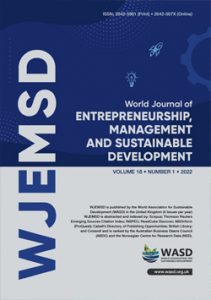Strategic steps for Nigerian hospitality human capital development, Dr. Abimbola Alamu and Prof. Rocky Dwyer
 Dr. Abimbola P. Alamu
Dr. Abimbola P. Alamu
The Shell Petroleum Development Company of Nigeria Ltd (SPDC), Port Harcourt
Nigeria
Prof. Rocky J. Dwyer
College of Management and Technology
Walden University, Minneapolis, Minnesota
USA
Email: rocky.dwyer@mail.waldenu.edu
DOI: 10.1108/WJEMSD-05-2017-0023
Purpose: The purpose of this paper is to explore human capital (HC) productivity strategies used by the tourism, hospitality, and leisure (THL) industry business leaders in Nigeria which improved the employee productivity.
Design/methodology/approach: The participants in this research study comprised randomly selected Southern Nigerian business leaders with specialist expertise in the THL industry. Individual interviews were undertaken with participants to gain both an insight and understanding regarding which strategies are best suited to improve employee productivity. A further analysis of workplace policies and procedures provided additional insights related to the application of such workplace practices toward productivity improvements.
Findings: The findings of this study identified that recruiting persons with essential social capital, inducting them into high ethical standards, providing in-house training, motivating employees with reward and recognition, and the adoption of affordable technologies are key industry strategies to build a productive employee workforce.
Practical implications: Implementing the findings from this study may help develop a new type of THL professionals, especially in the hotel and restaurant sub-sectors that will enhance the attractiveness of the THL industry and encourage patronage. The opportunity to interact with new people in THL businesses and locations may promote social interaction and integration that are invaluable to an ethnically and religiously diverse country such as Nigeria. These benefits are valuable and are essential positive social changes.
Originality/value: A structured HCD program might deliver a net benefit to the industry. To the employees, there may be improved remuneration, increased self-esteem, and job security. To the industry, there may be a reduction in employee turnover, improvement in productivity, improved attraction of graduates, and reduced engagement of illegal workers. The government could also experience increased gross domestic product.
Keywords: Human capital productivity strategies; Improved employee productivity; Tourism, hospitality, and leisure industry; Workplace policies and procedures.
Citation: Alamu, A.P. and Dwyer, R.J. (2017), "Strategic steps for Nigerian hospitality human capital development", World Journal of Entrepreneurship, Management and Sustainable Development, Vol. 13 No. 4, pp. 318-333. https://doi.org/10.1108/WJEMSD-05-2017-0023

